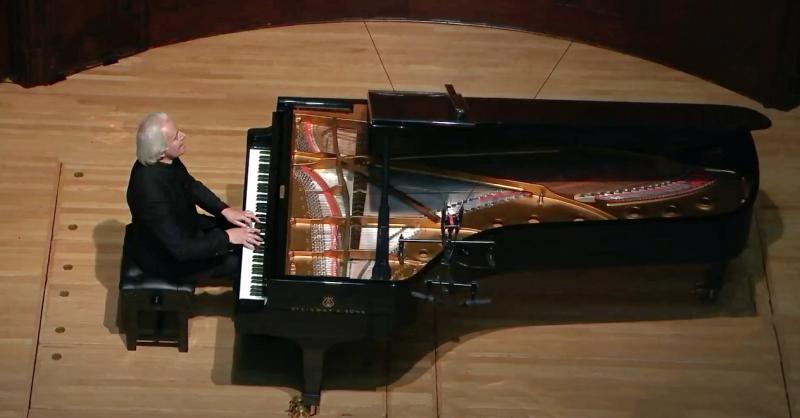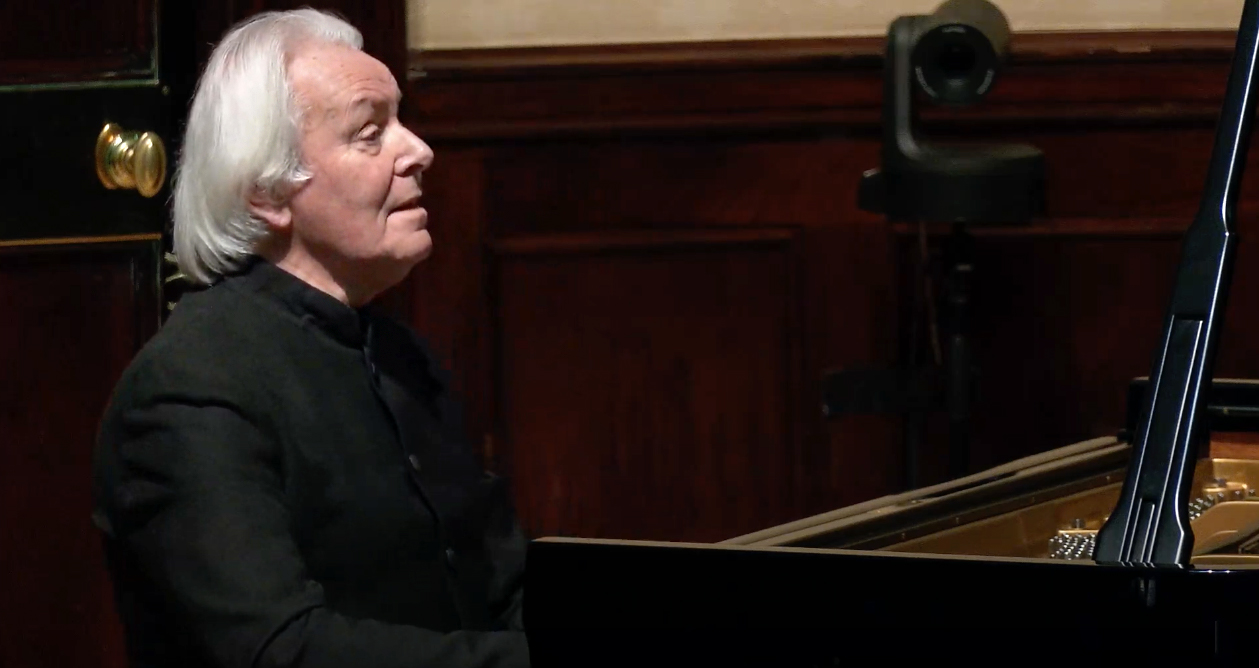Christian Blackshaw, Wigmore Hall online review - pure as the driven snow | reviews, news & interviews
Christian Blackshaw, Wigmore Hall online review - pure as the driven snow
Christian Blackshaw, Wigmore Hall online review - pure as the driven snow
The British pianist takes Mozart and Schubert on their own terms

From a distance, the pianist Christian Blackshaw bears an uncanny resemblance to Franz Liszt, silver hair swept back à la 19th century. At the piano, though, you could scarcely find two more different musicians. There seems not to be a flamboyant bone in Blackshaw’s body.
Blackshaw’s choice of three Mozart stand-alone pieces to form a type of sonata might not be entirely convincing, but each is a sliver of perfection in its own right: the dark billowing of the D minor Fantasia K387, the insouciant charm of the D major Rondo K485, and the mysterious Adagio K540 in B minor, an unusual and implicitly very personal choice of key for Mozart, seem to show us the composer’s most intimate moments confiding in the piano keyboard. Blackshaw’s rounded, luminous tone suits the songfulness of Mozart’s phrasing, but he never turned the pieces into miniature operas, taking them on their own terms and with nothing more or less than their own intent.  Mozart is a composer for all seasons, yet somehow Schubert best suits winter, with shadowy, hushed evenings sheltering from the snow. The instrument could be the repository for some of his darkest thoughts, but not in the D major Sonata D850, where he sometimes seems to plaster on the Austrian-mountain charm with a bit of a fixed grin. It’s a strange bird in its composer’s sonata nest, its feathers brighter and its call louder than many of its siblings. Schubert is an ideal composer for Blackshaw’s type of pianism, with that pure tone, subtle emotionality and beautiful legato, and if his playing here occasionally verged, in the first and third movements, on the slightly over-determined, that’s partly the composer’s doing. For instance, the scherzo is built on an awkward yet obsessive rhythm that scarcely lets up but for a breath of fresh air in the trio, and it’s rare that it flies easily.
Mozart is a composer for all seasons, yet somehow Schubert best suits winter, with shadowy, hushed evenings sheltering from the snow. The instrument could be the repository for some of his darkest thoughts, but not in the D major Sonata D850, where he sometimes seems to plaster on the Austrian-mountain charm with a bit of a fixed grin. It’s a strange bird in its composer’s sonata nest, its feathers brighter and its call louder than many of its siblings. Schubert is an ideal composer for Blackshaw’s type of pianism, with that pure tone, subtle emotionality and beautiful legato, and if his playing here occasionally verged, in the first and third movements, on the slightly over-determined, that’s partly the composer’s doing. For instance, the scherzo is built on an awkward yet obsessive rhythm that scarcely lets up but for a breath of fresh air in the trio, and it’s rare that it flies easily.
It’s a sonata that – unlike some of Schubert’s others – seems designed for a public, or at least a small Schubertiade gathering of close friends. At the moment no concert hall can hold so much as that, and the loneliness of the long-distance communication sometimes seemed palpable. The second movement, though, was magical, with a hushed, breath-holding beauty that perfectly captured Schubert’s knife-edge between smiles and tears. And that is pretty much where we remain.
rating
Share this article
The future of Arts Journalism
You can stop theartsdesk.com closing!
We urgently need financing to survive. Our fundraising drive has thus far raised £49,000 but we need to reach £100,000 or we will be forced to close. Please contribute here: https://gofund.me/c3f6033d
And if you can forward this information to anyone who might assist, we’d be grateful.

Subscribe to theartsdesk.com
Thank you for continuing to read our work on theartsdesk.com. For unlimited access to every article in its entirety, including our archive of more than 15,000 pieces, we're asking for £5 per month or £40 per year. We feel it's a very good deal, and hope you do too.
To take a subscription now simply click here.
And if you're looking for that extra gift for a friend or family member, why not treat them to a theartsdesk.com gift subscription?
more Classical music
 Bizet in 150th anniversary year: rich and rare French offerings from Palazzetto Bru Zane
Specialists in French romantic music unveil a treasure trove both live and on disc
Bizet in 150th anniversary year: rich and rare French offerings from Palazzetto Bru Zane
Specialists in French romantic music unveil a treasure trove both live and on disc
 Scottish Chamber Orchestra, Ibragimova, Queen’s Hall, Edinburgh review - rarities, novelties and drumrolls
A pity the SCO didn't pick a better showcase for a shining guest artist
Scottish Chamber Orchestra, Ibragimova, Queen’s Hall, Edinburgh review - rarities, novelties and drumrolls
A pity the SCO didn't pick a better showcase for a shining guest artist
 Kilsby, Parkes, Sinfonia of London, Wilson, Barbican review - string things zing and sing in expert hands
British masterpieces for strings plus other-worldly tenor and horn - and a muscular rarity
Kilsby, Parkes, Sinfonia of London, Wilson, Barbican review - string things zing and sing in expert hands
British masterpieces for strings plus other-worldly tenor and horn - and a muscular rarity
 From Historical to Hip-Hop, Classically Black Music Festival, Kings Place review - a cluster of impressive stars for the future
From quasi-Mozartian elegance to the gritty humour of a kitchen inspection
From Historical to Hip-Hop, Classically Black Music Festival, Kings Place review - a cluster of impressive stars for the future
From quasi-Mozartian elegance to the gritty humour of a kitchen inspection
 Shibe, LSO, Adès, Barbican review - gaudy and glorious new music alongside serene Sibelius
Adès’s passion makes persuasive case for the music he loves, both new and old
Shibe, LSO, Adès, Barbican review - gaudy and glorious new music alongside serene Sibelius
Adès’s passion makes persuasive case for the music he loves, both new and old
 Anja Mittermüller, Richard Fu, Wigmore Hall review - a glorious hall debut
The Austrian mezzo shines - at the age of 22
Anja Mittermüller, Richard Fu, Wigmore Hall review - a glorious hall debut
The Austrian mezzo shines - at the age of 22
 First Person: clarinettist Oliver Pashley on the new horizons of The Hermes Experiment's latest album
Compositions by members of this unusual quartet feature for the first time
First Person: clarinettist Oliver Pashley on the new horizons of The Hermes Experiment's latest album
Compositions by members of this unusual quartet feature for the first time
 Gesualdo Passione, Les Arts Florissants, Amala Dior Company, Barbican review - inspired collaboration excavates the music's humanity
At times it was like watching an anarchic religious procession
Gesualdo Passione, Les Arts Florissants, Amala Dior Company, Barbican review - inspired collaboration excavates the music's humanity
At times it was like watching an anarchic religious procession
 Classical CDs: Camels, concrete and cabaret
An influential American composer's 90th birthday box, plus British piano concertos and a father-and-son duo
Classical CDs: Camels, concrete and cabaret
An influential American composer's 90th birthday box, plus British piano concertos and a father-and-son duo
 Cockerham, Manchester Camerata, Sheen, Martin Harris Centre, Manchester review - re-enacting the dawn of modernism
Two UK premieres added to three miniatures from a seminal event of January 1914
Cockerham, Manchester Camerata, Sheen, Martin Harris Centre, Manchester review - re-enacting the dawn of modernism
Two UK premieres added to three miniatures from a seminal event of January 1914
 Kempf, Brno Philharmonic, Davies, Bridgewater Hall, Manchester review - European tradition meets American jazz
Bouncing Czechs enjoy their Gershwin and Brubeck alongside Janáček and Dvořák
Kempf, Brno Philharmonic, Davies, Bridgewater Hall, Manchester review - European tradition meets American jazz
Bouncing Czechs enjoy their Gershwin and Brubeck alongside Janáček and Dvořák
 Solomon, OAE, Butt, QEH review - daft Biblical whitewashing with great choruses
Even a top soprano and mezzo can’t make this Handel paean wholly convincing
Solomon, OAE, Butt, QEH review - daft Biblical whitewashing with great choruses
Even a top soprano and mezzo can’t make this Handel paean wholly convincing

Add comment